
Abraham Lincoln was the 16th president of the United States, serving from 1861 until his assassination in 1865. He led the United States through the American Civil War, defending the nation as a constitutional union, defeating the Confederacy, playing a major role in the abolition of slavery, expanding the power of the federal government, and modernizing the U.S. economy.

Samuel Alexander Mudd Sr. was an American physician who was imprisoned for conspiring with John Wilkes Booth concerning the assassination of Abraham Lincoln.
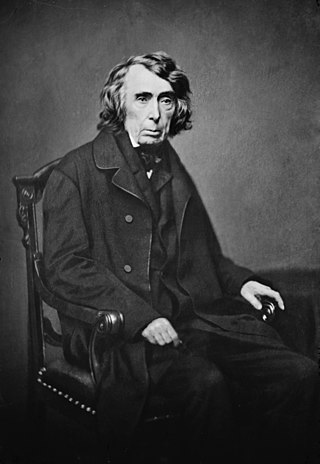
Ex parte Merryman, 17 F. Cas. 144 (No. 9487), was a controversial U.S. federal court case that arose out of the American Civil War. It was a test of the authority of the President to suspend "the privilege of the writ of habeas corpus" under the Constitution's Suspension Clause, when Congress was in recess and therefore unavailable to do so itself. More generally, the case raised questions about the ability of the executive branch to decline to enforce judicial decisions when the executive believes them to be erroneous and harmful to its own legal powers.
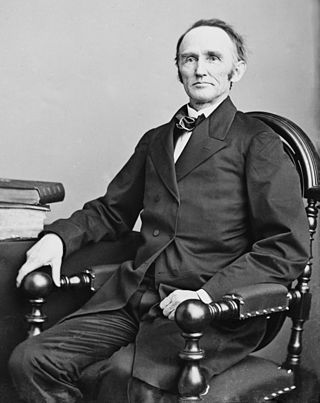
Montgomery Blair was an American politician and lawyer from Maryland. He served in the Lincoln administration cabinet as Postmaster-General from 1861 to 1864, during the Civil War. He was the son of Francis Preston Blair, elder brother of Francis Preston Blair Jr. and cousin of B. Gratz Brown.

In the 1860s, the Copperheads, also known as Peace Democrats, were a faction of the Democratic Party in the Union who opposed the American Civil War and wanted an immediate peace settlement with the Confederates.

Robert Todd Lincoln was an American lawyer and businessman. The eldest son of President Abraham Lincoln and Mary Todd Lincoln, he was the only one of their four children to survive past the teenage years and also the only to outlive both parents. Robert Lincoln became a business lawyer and company president, and served as both United States Secretary of War (1881–1885) and the U.S. Ambassador to Great Britain (1889–1893).
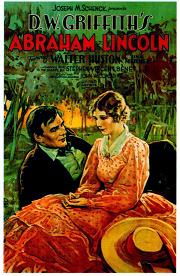
Abraham Lincoln, also released under the title D. W. Griffith's "Abraham Lincoln", is a 1930 pre-Code American biographical film about Abraham Lincoln directed by D. W. Griffith. It stars Walter Huston as Lincoln and Una Merkel, in her second speaking role, as Ann Rutledge. The script was co-written by Stephen Vincent Benét, author of the Civil War prose poem John Brown's Body (1928), and Gerrit Lloyd. This was the first of only two sound films made by Griffith.

Nathaniel Gordon was an American slave trader who was the only person in the United States to be tried, convicted, and executed by the federal government for having "engaged in the slave trade" under the Piracy Law of 1820.
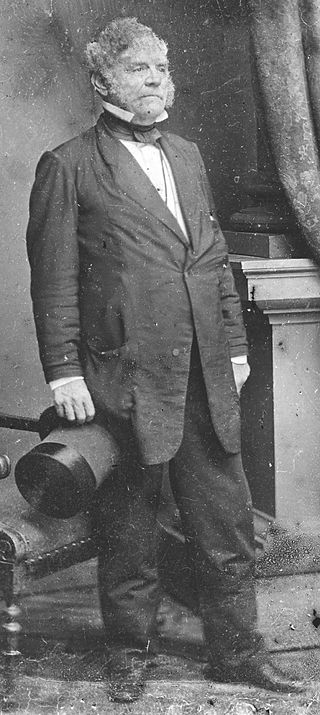
Thomas Holliday Hicks was a politician in the divided border-state of Maryland during the American Civil War. As governor, opposing the Democrats, his views accurately reflected the conflicting local loyalties. He was pro-slavery but anti-secession. Under pressure to call the General Assembly into special session, he held it in the pro-Union town of Frederick, where he was able to keep the state from seceding to join the Confederacy.
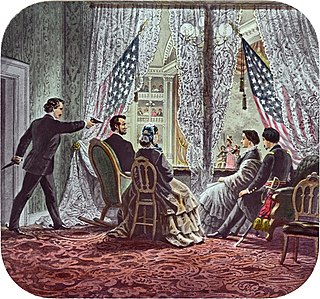
On April 14, 1865, Abraham Lincoln, the 16th president of the United States, was shot by John Wilkes Booth while attending the play Our American Cousin at Ford's Theatre in Washington, D.C. Shot in the head as he watched the play, Lincoln died of his wounds the following day at 7:22 am in the Petersen House opposite the theater. He was the first U.S. president to be assassinated. His funeral and burial were marked by an extended period of national mourning.

The 3rd Vermont Infantry Regiment was a three-years infantry regiment in the Union Army during the American Civil War. It served in the eastern theater, predominantly in the VI Corps, Army of the Potomac, from July 1861 to July 1865. It was a member of the Vermont Brigade.

Abraham Lincoln's Clemency was a 1910 American film directed by Theodore Wharton and produced by Pathé Films. The plot revolves around U.S. President Abraham Lincoln pardoning a hapless sentry who had fallen asleep while on duty during the height of the American Civil War. Due to the soldier's incompetence he is due to face the firing squad. However, his mother pleads with the President to save her son, which, as the title suggests, he does. The film was a single reel in length.
The Reprieve: An Episode in the Life of Abraham Lincoln was a 1908 film that included an unknown actor portraying US President Abraham Lincoln pardoning William Scott.

Lucius Eugene Chittenden was an American author, banker, lawyer, politician and peace advocate who served as Register of the Treasury during the Lincoln administration.

Since his death in 1865, Abraham Lincoln has been an iconic American figure depicted, usually favorably or heroically, in many forms. Lincoln has often been portrayed by Hollywood, almost always in a flattering light. He has been depicted in a wide range of forms including alternative timelines, animation, documentary, small cameos, and fictionalized interpretations.
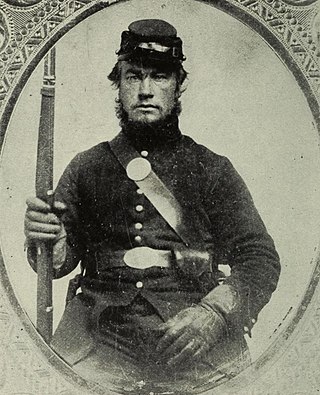
William Scott was a Union Army soldier during the American Civil War. He was the "Sleeping Sentinel" who was pardoned by Abraham Lincoln and memorialized by a poem and then a 1914 silent film.

The Habeas Corpus Suspension Act, 12 Stat. 755 (1863), entitled An Act relating to Habeas Corpus, and regulating Judicial Proceedings in Certain Cases, was an Act of Congress that authorized the president of the United States to suspend the right of habeas corpus in response to the American Civil War and provided for the release of political prisoners. It began in the House of Representatives as an indemnity bill, introduced on December 5, 1862, releasing the president and his subordinates from any liability for having suspended habeas corpus without congressional approval. The Senate amended the House's bill, and the compromise reported out of the conference committee altered it to qualify the indemnity and to suspend habeas corpus on Congress's own authority. Abraham Lincoln signed the bill into law on March 3, 1863, and suspended habeas corpus under the authority it granted him six months later. The suspension was partially lifted with the issuance of Proclamation 148 by Andrew Johnson, and the Act became inoperative with the end of the Civil War. The exceptions to Johnson's Proclamation 148 were the States of Virginia, Kentucky, Tennessee, North Carolina, South Carolina, Georgia, Florida, Alabama, Mississippi, Louisiana, Arkansas, and Texas, the District of Columbia, and the Territories of New Mexico and Arizona.
Federal pardons in the United States are granted only by the U.S. president, pursuant to their authority under the U.S. Constitution to grant "reprieves and pardons for offenses against the United States". Pardons extend to all federal criminal offenses, except in cases of impeachment, and entail various forms of clemency, including commuting or postponing a sentence, remitting a fine or restitution, delaying the imposition of a punishment, and providing amnesty to an entire group or class of individuals.
















